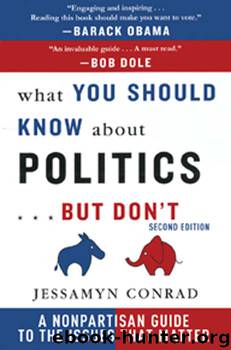What You Should Know About Politics...But Don't by Jessamyn Conrad

Author:Jessamyn Conrad [Conrad, Jessamyn]
Language: eng
Format: epub
ISBN: 978-1-61145-475-8
Publisher: Arcade Publishing
Published: 2011-08-31T16:00:00+00:00
Current Debates
In 1987, Republican senator John Chafee of Rhode Island introduced early legislation to phase out ozone-destroying substances, partly over concern about global warming, deeming them “monumental problems with a doomsday effect.”5 Nowadays his concerns are widely echoed; even the once doubtful, including President George W. Bush, have recognized that global warming is real, is at least partly caused by humans, and is a critical problem that needs to be addressed. The old debate over whether climate change is occur-ing is dead; the current debate focuses on what to do about it.
First, the terms. Climate change refers to any change in the earth’s climate — natural or human-caused. Global warming refers to the trend toward higher mean temperatures seen recently worldwide. It’s important to note, however, that “global warming” refers only to an average — some places, in fact, seem to be getting colder, and the incidence of violent weather appears to be on the upswing. Technically, the terms “global warming” and “climate change” don’t imply human causes for the temperature increase, though we tend to interpret both that way. Climate change per se was never really contentious, since the earth’s climate has changed both drastically and moderately over time. Global warming was once a matter for scientific debate, but now the trend is indisputable: things are heating up. Scientists think current global warming is partly due to the greenhouse effect: greenhouse gases, including methane, water vapor, and especially carbon dioxide, trap energy in the atmosphere and warm the earth, as the glass panes of a greenhouse warm the air inside it. There is more carbon dioxide in the atmosphere now than ever before in human history because we have been burning coal, oil, and gas for the past couple of hundred years, releasing their stored carbon. Scientists predict that various areas will be affected differently by global warming: Asia, Africa, and South America may be worst hit, with more violent weather, both longer and more frequent droughts, and catastrophic floods. Europe could become significantly colder. Climate change skeptics often interpret data showing cooling trends as evidence against global warming — but because of the asymmetric effects of global warming, such local cooling is, in fact, in keeping with the theory. Seas will rise from melting ice caps and glaciers, a process happening much faster than initially expected, and if enough ice melts, coastal areas could be inundated — especially problematic in places where it’s hard for people to relocate or where coastal property is highly valuable. Russia might be the biggest winner: warming could thaw the vast tundra in Siberia, thereby increasing agricultural output and easing extraction of oil and gas, much of which are currently locked under permafrost that is expensive and difficult to drill.
The first major legislation on global warming was the international United Nations Framework Convention on Climate Change, or UNFCCC, a legally nonbinding treaty that the United States signed in 1992. It didn’t impose any standards for emissions, but rather established a framework in which those controls would be created.
Download
This site does not store any files on its server. We only index and link to content provided by other sites. Please contact the content providers to delete copyright contents if any and email us, we'll remove relevant links or contents immediately.
The Secret History by Donna Tartt(19047)
The Social Justice Warrior Handbook by Lisa De Pasquale(12186)
Thirteen Reasons Why by Jay Asher(8892)
This Is How You Lose Her by Junot Diaz(6877)
Weapons of Math Destruction by Cathy O'Neil(6264)
Zero to One by Peter Thiel(5786)
Beartown by Fredrik Backman(5737)
The Myth of the Strong Leader by Archie Brown(5496)
The Fire Next Time by James Baldwin(5431)
How Democracies Die by Steven Levitsky & Daniel Ziblatt(5213)
Promise Me, Dad by Joe Biden(5141)
Stone's Rules by Roger Stone(5080)
A Higher Loyalty: Truth, Lies, and Leadership by James Comey(4950)
100 Deadly Skills by Clint Emerson(4919)
Rise and Kill First by Ronen Bergman(4778)
Secrecy World by Jake Bernstein(4740)
The David Icke Guide to the Global Conspiracy (and how to end it) by David Icke(4699)
The Farm by Tom Rob Smith(4502)
The Doomsday Machine by Daniel Ellsberg(4484)
